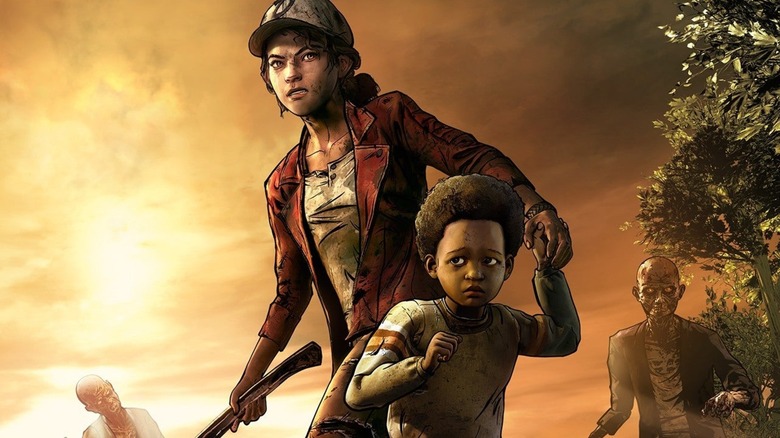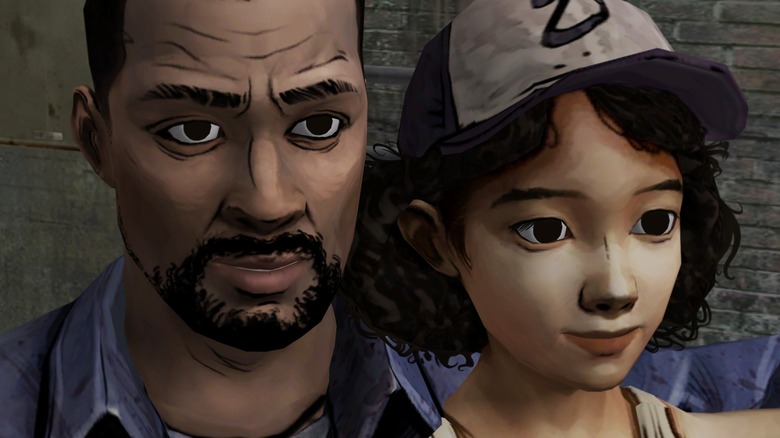The Walking Dead Creator Changed Telltale's Beloved Video Game In One Major Way
In Robert Kirkman's "The Walking Dead" comic book series, no one is safe. Just when you get attached to a character, the story has a way of destabilizing your emotions at every turn. The comics, of course, paved the path of the eponymous zombie horror series, which is mostly synonymous with Rick Grimes (Andrew Lincoln) and his exploits. While the comics situate Rick front and center, it is also an intense examination of trauma in the face of an unnatural threat, where survival perpetuates humanity's worst instincts. Kirkman's world (which is mirrored in the AMC show) is terrifyingly bleak, where folks have little reason to cling to socially-regulated morals or sanity. Despite this nihilistic undertone, "The Walking Dead" comic series sincerely rallies for hope, firmly believing that only unconditional love can counter the brutality of such a bitter existence.
When Telltale Games decided to make an episodic adventure title based on "The Walking Dead" in 2011, the concept proposal revolved more around survival horror and choice-based gameplay than full-fledged combat. This approach made sense considering Telltale's track record of crafting successful video games of a similar variety, including the satirical and puzzle-oriented "Sam & Max Save the World." There were talks for a "Left 4 Dead" spinoff before a deal with Kirkman and Warner Bros. was finalized (which could've been a banger as well), but there's good reason to be thankful that Telltale eventually went with "The Walking Dead" instead. After all, season one of the game will leave you breathless with its artistic ingenuity, while the remaining installments will make sure to round off the visceral experience with an emotional gut punch that you'll never forget.
Such high praise might sound like exaggeration at first, but Telltale's "The Walking Dead" deserves its flowers, and more. Decision-based games often employ clever illusions of choice to weave tense narratives, but this game leans on causality without compromise, adding moral weight to the major decisions you make. The quality of the evolving story — which is tailored according to your choices — remains consistently brilliant, allowing the game to bloom into something completely different while still being faithful to the comic books' universe.
The Walking Dead's creator had one request for Telltale's episodic adventure game
Kirkman's involvement in Telltale's project was crucial, as he helped incorporate existing characters into the new story and honed some of the worldbuilding elements to echo the vibe of the comics. However, Kirkman wasn't one to tightly regulate an artistic process, as he had faith in Telltale's ability to weave something inspired and special, as he had previously enjoyed their fun, quirky point-and-click "Strong Bad's Cool Game for Attractive People" (which is, sadly, no longer on Steam).
However, the comic book writer had one non-negotiable request: Telltale couldn't tell Rick Grimes' story, as it was still the focal point of the comics/show at that point. Telltale CEO Dan Connors spoke to Rock Paper Shotgun about this off-limits storyline, the absence of which turned out to be a blessing in disguise:
"We didn't go after Rick's story. He [Kirkman] didn't want us to mess with the show. We were very conscious of his fiction and timeline, and where people are. He's got characters he wants to write books about. He's got novels going on. Basically, if he's in there exploring something, he wants the right to dictate how that fiction goes. If it's something that's free and clear, like Lee and Clementine, whom we've created, we can do whatever we want."
Clementine and Lee can be considered the emotional nexus of "The Walking Dead" game, as their evolving relationship (a chunk of which is determined by the player's choices) defines the experience you glean from the individual episodes. Lee encounters young Clementine during the apocalypse and protects her out of instinct, gradually teaching her how to defend herself against the undead and other hostile survivors. With player choices playing such a crucial role in defining Lee as a character, his personality shifts and mutates, but one thing never changes: his deep affection for Clementine. Parallels to Joel and Ellie from "The Last of Us" are often evoked because of the found family trope, but the Lee-Clementine dynamic is significantly less complex (and distressing) than the central duo in "The Last of Us."
Although Telltale's critically acclaimed episodic title has no Rick Grimes, it is a heartbreakingly effective story about the cost of survival and how it changes people for better or worse. With Kirkman "always filling [Telltale] in on the universe", there was little risk of the narrative ever going astray or losing its thematic ties to the franchise at large. Five compelling seasons later, it emerges as a survival story that everyone should experience at some point in their lives.

